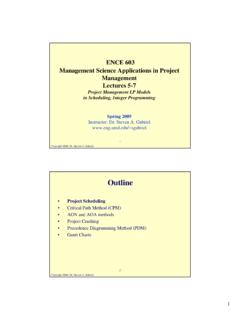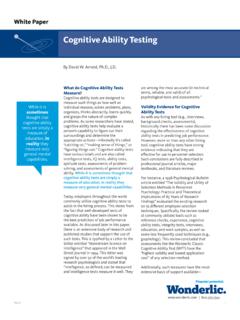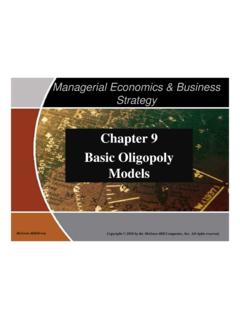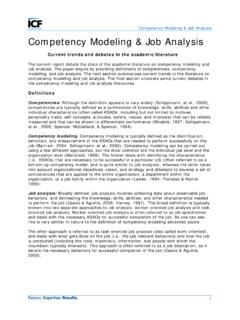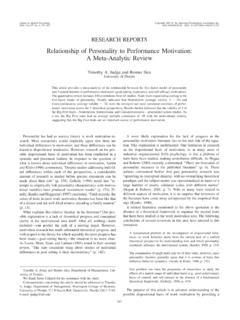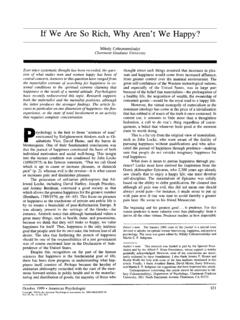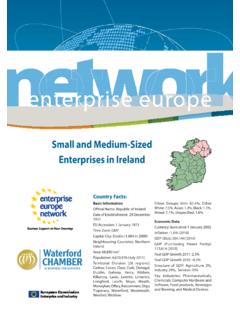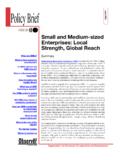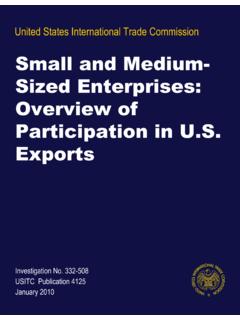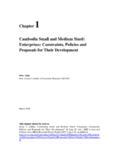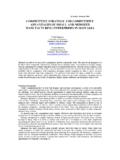Transcription of Successful strategic alliances with international partners ...
1 232 Int. J. Business Innovation and Research, Vol. 3, No. 3, 2009. Successful strategic alliances with international partners : key issues for small- to medium-sized enterprises Van R. Wood*. Department of Marketing, School of Business, Virginia Commonwealth University, 1015 Floyd Avenue, Richmond, VA 23284-4000, USA. E-mail: *Corresponding author Dennis A. Pitta University of Baltimore, 1420 N. Charles Street, Baltimore, MD 21201 5779, USA. E-mail: Frank J. Franzak Virginia Commonwealth University, Richmond, VA 23284-4000, USA. E-mail: Abstract: As international markets grow, many small- and medium-sized enterprises (SMEs) are finding lucrative opportunities to serve overseas consumers and source from overseas suppliers.
2 The impact of information technology has made world-wide communication easier and more rapid. Some SMEs are literally born global', ready to do business on the internet. For many SMEs, this new commercial frontier offers both great promise and the challenge of determining: What are the key drivers of success in new and unknown international markets? This article focuses on this question from the perspective of strategic alliances in the global business environment. It develops a model to guide SMEs in managing overseas partners or allies that will fit' best with their company and their ambitions. The model provides SMEs with both strategic and tactical dimensions that are key international business arena.
3 This article guides SMEs to get it right' when selecting allies in overseas markets. Keywords: global market success; international strategic alliances ; SMEs;. small- to medium-sized enterprises; strategic and tactical congruence. Reference to this paper should be made as follows: Wood, , Pitta, and Franzak, (2009) Successful strategic alliances with international partners : key issues for small- to medium-sized enterprises', Int. J. Business Innovation and Research, Vol. 3, No. 3, 251. Copyright 2009 Inderscience Enterprises Ltd. Successful strategic alliances with international partners 233. Biographical notes: Van R.
4 Wood (PhD) is a Professor of international Marketing and the Philip Morris Endowed Chair in international Business at Virginia Commonwealth University, Richmond, Virginia, USA. He earned his doctorate at the University of Oregon (PhD international Marketing 1982). He has published his research in numerous scholarly and practitioner focused journals including Journal of Marketing, Journal of Marketing Research, Journal of international Business Studies, international Marketing Review and IIE Networker. He has also been awarded grants to develop international programmes from the Fulbright Commission, World Bank, the US Department of Education, the US Department of Commence, Virginia Commonwealth University, Texas Tech University and other institutions.
5 Dennis A. Pitta earned his PhD in Marketing from the University of Maryland College Park. He holds the rank of Professor and is currently the J. William Middendorf Distinguished Professor at the University of Baltimore. He had authored or co-authored a number of refereed journal articles. He has published in scholarly and practitioner focused journals, such as Journal of Consumer Marketing, Journal of Product and Brand Management, Int. J. Advertising, international Business and Economics Research Journal, and Journal of Business and Economics Research. His teaching and research areas are new product development, creativity and creative culture, and global marketing strategy.
6 Frank J. Franzak holds a PhD from the University of Maryland. He is an Associate Professor of Marketing in the School of Business at Virginia Commonwealth University, Richmond, Virginia, USA. He served as Department Chair for a number of years. He has published in scholarly and practitioner focused journals, such as Journal of Consumer Marketing, Journal of Product and Brand Management and Journal of Product Innovation Management. His research interests include marketing's role in new product development, innovation and technology, and responsible marketing. 1 Introduction As domestic markets continue to mature, international markets are now attractive growth targets for many firms that previously had not considered overseas opportunities.
7 More and more, small- to medium-sized enterprises (SMEs in the USA and elsewhere). which constitute significant employment and profit generating organisations are venturing into, or at least considering, international markets as future prospects (Moen and Servais, 2002; Thai and Chong, 2008). However, while larger firms with their considerable global experience and clout are adept at many of the requirements for entering overseas markets, entry for SMEs into new and complex environments is often perceived as risky if not daunting (Etemad, 2004;. Kauser, 2007). Faced with differing political and legal climates, disparate social and cultural norms and diverse levels of technological acceptance and product 234 Wood, Pitta and Franzak standards, international markets can represent confusing, if not intimidating business environments for the uninitiated (Karn e, Kristensen and Houman, 1999).
8 In such environments, many SMEs find themselves in need of guidance (Street and Cameron, 2007). For these and other reasons, models and methods that offer SMEs the means by which seemingly enigmatic international markets can be approached and analysed have long been valued (Ohmae, 1989). One well-known strategy for expanding overseas calls for firms, to seek foreign market success by developing mutually beneficial relationships or partnerships with non-domestic counterparts, who are indigenous to the markets of promise (Ali 1991; Baradacco 1991; Barrett 1992). The guidance of knowledge transfer from both ends of an alliance is a key to any global spanning strategic alliance (Hall and Andriani, 2003).
9 2 Background of the research Globalization is not simple the transfer of work to emerging economies. Globalization is an art of human relations that, like other arts, is premised on insights gleaned from study and from experience, and honed by continual practice, day in and day out, in the business suites of the world's companies. Globalization concerns the exercise of management and leadership on a worldwide scale both at the strategic and tactical levels. Global business is by no means the sole preserve of large companies. For small- and medium-sized enterprises, too, it is neither a theory nor a discussion point, but a fact of life.
10 If SMEs are to thrive and prosper in today's globalized business environment they must, more so perhaps that larger firms, grasp the details of alliances both at the human relationship level and the strategic and tactical decision making levels (Andrews and Tyson, 2004, 5). As noted above, globalisation offers opportunities for all companies including SMEs. But globalisation requires SMEs to be particularly attuned the critical questions related to overseas partners and allies. There are many different forms of partnerships from which any organisation, including SMEs, seeking entry or expansion into foreign markets may choose.

